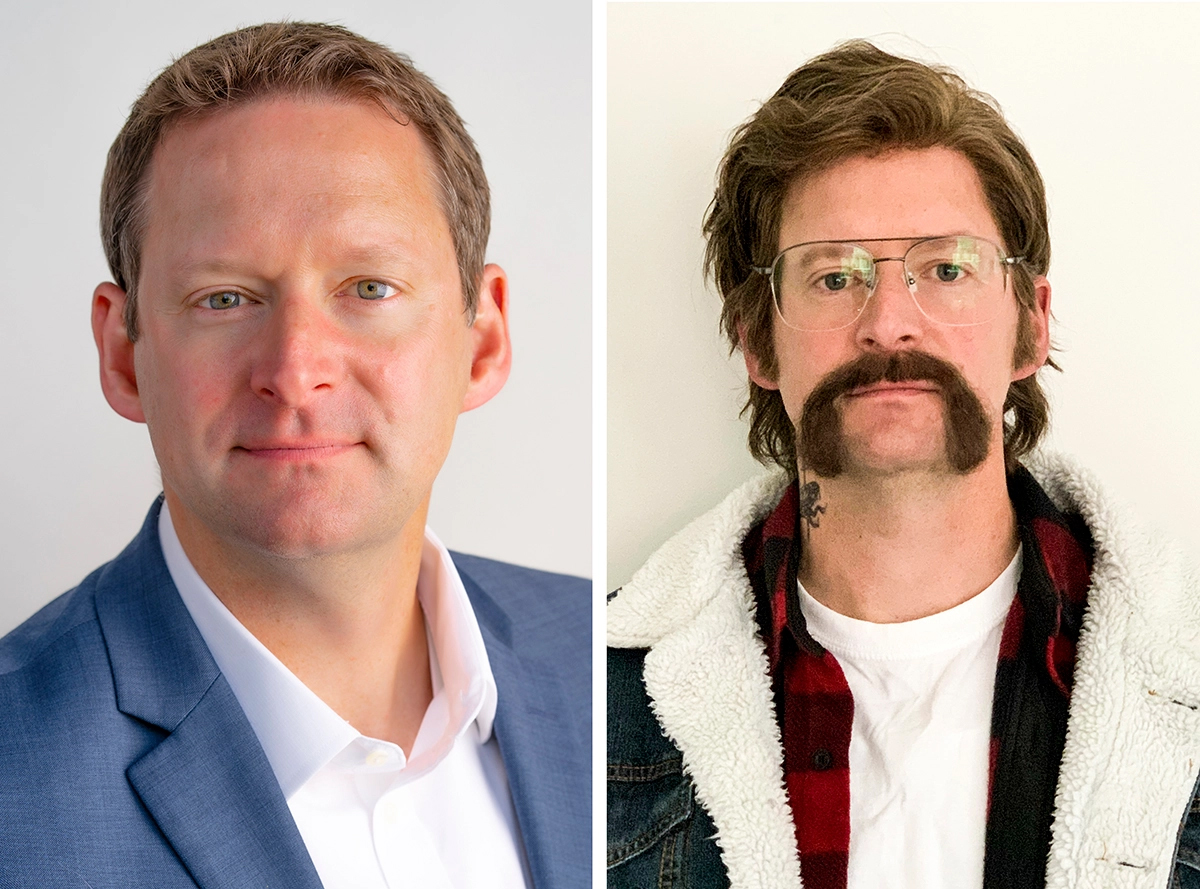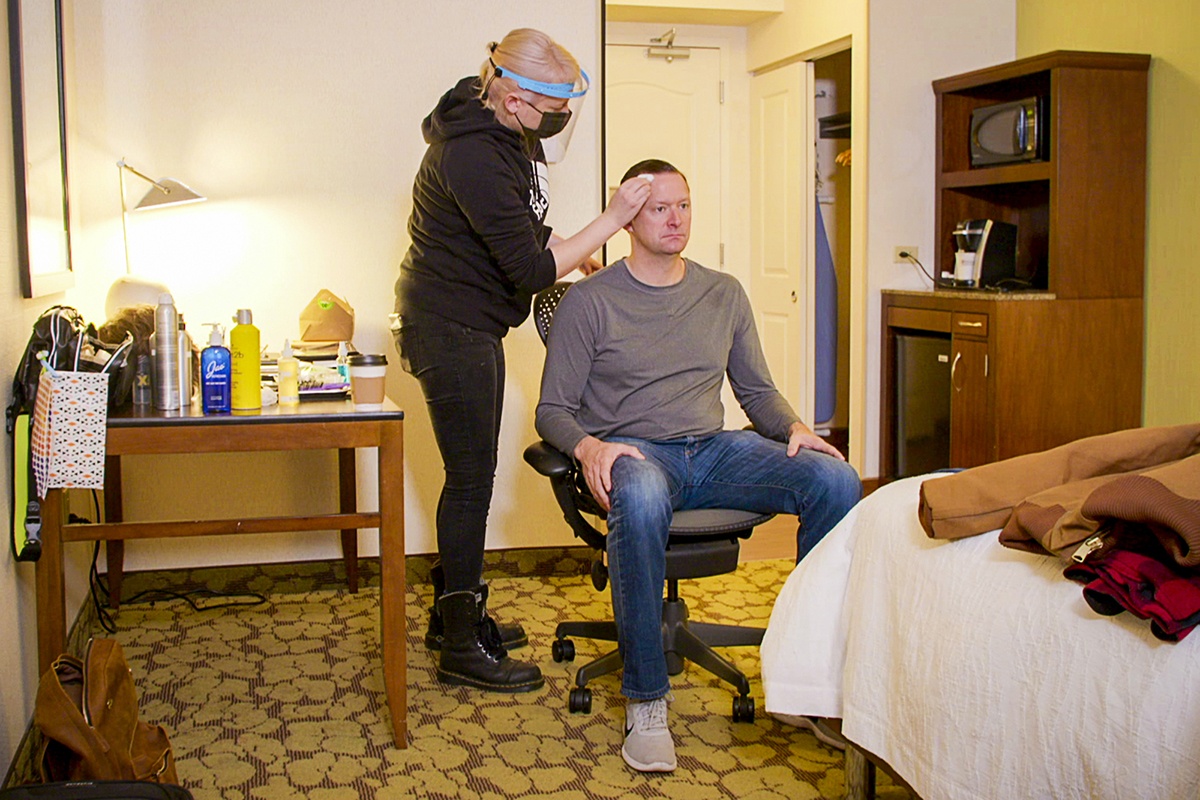Getting The Undercover Story
April 17, 2023
|
Dorian Martin '06
Executives L.T. Therivel ’96 and Larry O’donnell offer insights from ‘Undercover Boss’ and their careers.
Mays Business School students had the opportunity to learn from two corporate leaders who were featured on Undercover Boss, the popular CBS television series. The session included Larry O’Donnell, the former president and chief operating officer of Waste Management Inc., and Laurent C. (L.T.) Therivel ’96, who is president and CEO of UScellular.

Their advice, which covered both the professional and personal side of being a corporate leader, was well received by students who will soon be embarking on their careers. One area that particularly resonated was maintaining work-life balance. “I enjoyed hearing L.T. talk about finding your job, figuring out what it requires, and then determining whether
you’re willing to put that in,” said Erin Autrey ’25, an accounting major from Pittsburg, TX. “Then figure out your life goal and make sure that those two things—the job and your life goal—align.”
WASTE NAUGHT
O’Donnell was the first corporate leader featured on Undercover Boss. That show debuted after the 2010 Super Bowl and was watched by a record 38.6 million viewers.
The Houston resident, who took over the company when it was struggling, opened his presentation talking about leadership. O’Donnell advocated for flipping the traditional top-down leadership model where employees serve the leader. Instead, he has had success embracing the servant leadership model where the leader is at the bottom of the pyramid and serves everyone on the team. “The leader is pouring into everyone, helping them become the best they can be,” he explained. “Whatever they are trying to achieve in their career, the leader is trying to help them get there. Then what happens is a bond of trust is created and the whole team wins together.”
O’Donnell also offered some important early career advice. Foremost, he said, was focusing on the job at-hand and doing the best job possible. “Build a team and serve everybody on the team, including your boss and your colleagues,” he said. “If you’re that type of team player, you will be noticed, and you’ll advance in your career.”
He also encouraged the Aggies to be willing to address their knowledge and skill gaps so they can progress in a career. Noting that this is often uncomfortable, O’Donnell noted, “People often don’t want to face their deficiencies—but everybody’s got deficiencies.”
On a similar note, O’Donnell recommended finding a mentor— and then be coachable. “There are so many people who come to me who want help,” he said. “You start to coach them, and you can tell that they really don’t want to hear it; O’Donnell also talked about his own career path, which took some unexpected turns, as well as how his daughter’s life was tragically impacted by a medical mistake right after she was born, which brought about a tremendous change in O’Donnell as well.
O’Donnell said that event really tested his faith. “When my daughter’s tragedy first happened, I was pretty angry with God,” he said. “I told God it didn’t seem fair, but I later came to realize that it wasn’t about me and my plan, and that God had a different plan for my daughter than I had.”
His daughter’s medical shipwreck ultimately served as a mirror for O’Donnell. “I had no empathy at all before that happened. I then realized that I was a total mess; I was that top-down self-absorbed leadership guy,” he said, adding that he later decided to attend seminary, create a non-profit organization called Servant Ministries Foundation, and write a book, “Waste Management: Five Steps to Clean Up the Mess” to help others learn from my mistakes from my 40-plus-year business career. “My daughter’s tragedy taught me empathy, and when faced with difficulties to ask ‘what’ can I learn from this situation, rather than ‘why’ is this happening to me.”
O’Donnell added, “My special needs daughter is my inspiration. She is the happiest person you’d ever want to meet, and never complains about her pain.”
MAKING CONNECTIONS
Therivel joined UScellular in 2020 as chief executive officer for the fourth largest cellular company in the United States. UScellular focuses on providing cell service in underserved areas, many of which are rural. He was on the most recent season of Undercover Boss.
While noting that Undercover Boss provides opportunities to identify tactical and operational opportunities, Therivel said the show was just as important in validating the company’s culture and organizational buy-in. He pointed to his own experience working as COO with a small start-up that lacked clarity on objectives and goals. “I had been there two weeks and after doing my assessment, blew the place up,” he said. “New strategy, clear goals, clear KPIs, fired the three salespeople who had sold nothing, changed the org chart, hired some people, made a bunch of changes—and then off we went.”
After 30 months, the company hit its targets—but the CEO and chairman fired Therivel. “Everybody hated me,” he said. “It was my plan, my strategy, my KPIs, my org chart. Me, me, me…there was no ‘we’. When I go back and think about the decisions I made, they were the right decisions—but I spent zero time on culture and buy-in to get people to
believe in what we were doing.”
That turn of the events helped inform his leadership style. “It was a huge wake-up call for me. I was really lucky because I learned that lesson in my early 30s, so I had the chance to recover,” Therivel explained. “A lot of people don’t learn that lesson at all or maybe they learn it in their 50s.”
He now believes in the importance of the “how.” “Just having the right answer isn’t enough. If you’re in this room and going to this university, you are whip smart. You will get the right answer,” Therivel advised the students. “Spend as much time thinking about the ‘how’ because it’s going to be just as important as knowing the right answer. How to get people on board? Are they motivated by this? How do I get buy-in? How do I get consensus? How do I drive collaboration?”
Therivel also stressed understanding what the work requires and be willing to do it. At the same time, he recommended aligning professional and personal goals. He pointed to his time at AT&T where advancement required moving geographically to accept new assignments. At that time, he and his wife had two young daughters and they decided they would be willing to relocate until the children entered high school. “We decided we were willing to make moves for the professional good—and boy, did we. My daughters are 15 and this is house nine, school seven,” he said. “I was able to make those moves and put
in the work because I had confidence that I wasn’t sacrificing my family.”

He noted that many executives focus solely on their career without considering their personal lives. He cautioned, “If you’re not careful and you don’t spend the time investing on the personal side and making sure it’s aligned, at some point you reach a level where it’s really hard to recapture.”
UNINTENDED CONSEQUENCES
Both business leaders addressed unintended consequences that arose from their decisions. For example, O’Donnell described how he had started a program designed to coach workers on garbage trucks and to fix issues that were causing employees frustrations. However, the employee who O’Donnell worked with on Undercover Boss described them as “spies” sent by the corporate office. “Obviously at that location, it
hadn’t been communicated very well,” he told the students. “So, we totally revamped the communication aspect of it so that the drivers would realize that the organization was trying to help them achieve and get home sooner.”
In Therivel’s episode of Undercover Boss, he had to cold call customers—which was an effort he had championed—but the sales associates were unhappy about doing this because most calls went to voicemail. Their discontent was reflected in the show “The concept behind it is there is a fair amount of dead time in stores where you don’t have anybody in the store. You still have to staff the store and you can’t staff it with one person,” he explained. “A lot of times we have people who don’t have a lot to do. That was one idea of how we could better use people’s time.”
He also noted that in this case, the show didn’t tell the whole tale because a customer came into the store in response to the voicemail’s promotion of a specific plan.
Ultimately, both leaders felt it is important to listen to their employees and then
respond. “I’m in the field all the time— and I’m not preaching and I’m not telling people, ‘Here’s our strategy.’ All I do is that I walk into stores and say one thing: ‘If you were king or queen of the world, what is one thing that you’d change?’” Therivel said. “Ideally, every action that you take as a leader is tied back to feedback that you received. That way,
you’re creating this environment where people will try to give you feedback— but you also have to be cognizant that you’re never going to get it all.”


